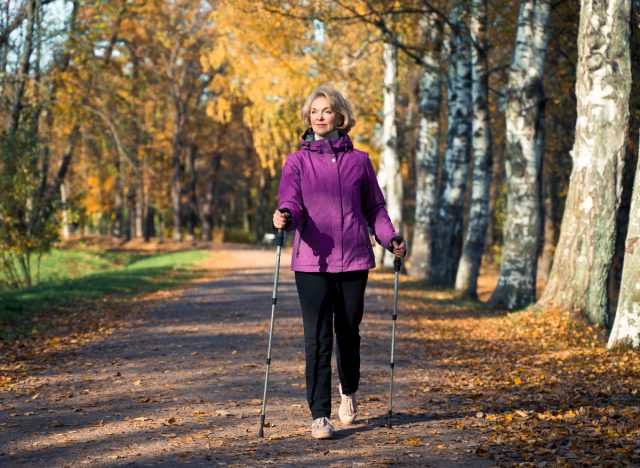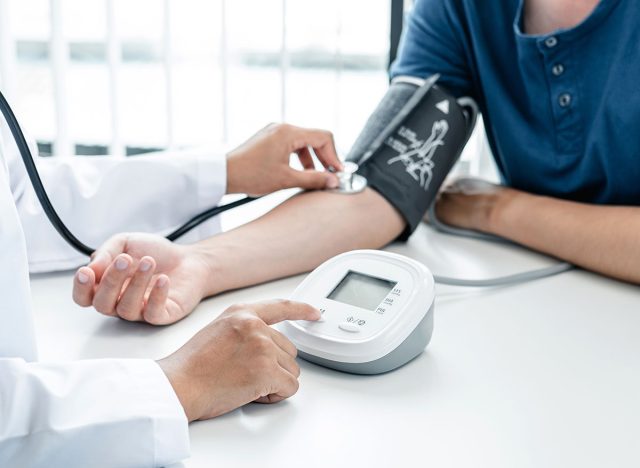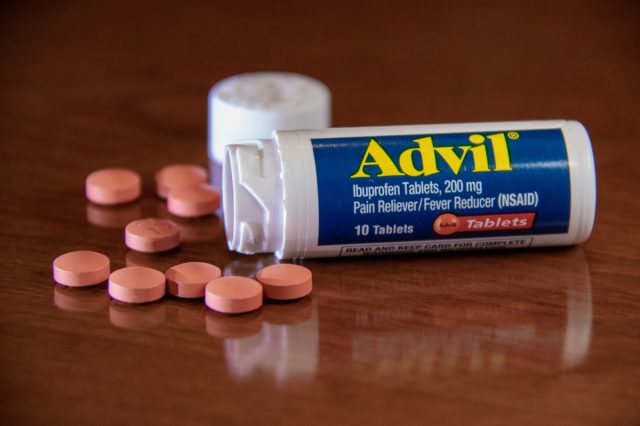Lifestyle Changes For High Blood Pressure To Make ASAP, Expert Says

There's a common diagnosis that many Americans deal with, and it all starts with the beating of your heart. According to the Centers for Disease Control and Prevention, your heart pumps your blood, and the process causes pressure against the walls of your arteries, which work really hard to deliver blood from your heart to the rest of your body. This natural process causes your blood pressure to fluctuate throughout the day. High blood pressure is caused when blood pressure consistently stays at an elevated level, and it can compromise your heart and overall health in many ways, including the risk of a stroke, heart attack, or heart disease (via CDC). So, it should come as no surprise that there are certain lifestyle changes for high blood pressure that you should make ASAP.
High blood pressure is referred to as the "silent killer," due to the fact it typically comes with no warning signs or symptoms (via CDC). This health condition does not happen overnight, and there are many lifestyle habits that can contribute to it, such as not getting enough exercise. Additionally, other factors can play a big role in developing elevated blood pressure, including being overweight, pregnancy, or having diabetes.
Read on to learn more about this condition and the lifestyle changes for high blood pressure you should consider making. And next, check out The 6 Best Exercises for Strong and Toned Arms in 2022, Trainer Says.
Many adults in the U.S. are unaware they have high blood pressure

If you've been diagnosed with high blood pressure, you're not alone. In fact, according to the CDC, 47% of all adults in the country have been diagnosed with hypertension, aka high blood pressure. Over 500,000 deaths in the United States were primarily caused by the chronic condition in 2019. Alarmingly, approximately 1 out of every 5 adults with high blood pressure is not even aware they have it, as per the CDC.
It's imperative to have regular checkups with your physician and stay in tune with your body. Blood pressure can be manageable, thereby placing you at a lower risk to develop other life-threatening health conditions that can affect your brain, heart, eyes, or kidneys.
There are two numbers used when measuring your blood pressure—here's what they mean

You're likely used to having your blood pressure taken when you see your medical professional, but do you know what's normal and what the numbers mean? There are two numbers used when measuring your blood pressure. The top number indicates your systolic blood pressure, which is the measurement of the physical force in your arteries as your heart beats. The bottom number represents your diastolic blood pressure, which is the measurement of the physical force in your arteries between the beats of your heart. A normal blood pressure measurement is "120 over 80," the CDC reports, which is representative of 120 systolic pressure and 80 diastolic pressure.
Lowering your daily sodium intake is key

We reached out to Dr. Juan Rivera, MD to find out what crucial lifestyle changes someone diagnosed with high blood pressure should make as soon as possible, and he has some suggestions to prevent or control high blood pressure.
First off, it's important to lower your daily sodium intake, as it should be less than 2000 mg. Rivera notes, "This requires you to pay attention to nutritional labels," and he recommends following a Dietary Approaches to Stop Hypertension (DASH) diet. Rivera also recommends drinking hibiscus tea—Dr. Juan's Santo Remedio hibiscus tea supplements, specifically, "keep your heart healthy" and are "enriched with Vitamin C."
Try to avoid NSAIDs

Next, try to avoid any non-steroidal anti-inflammatory drugs (NSAIDs), as Rivera cautions, "Frequent use can cause high blood pressure." The most commonly known NSAIDs include Ibuprofen (Advil® and Motrin®), Aspirin (St. Joseph® or Bayer®), and Naproxen sodium (Aleve®).
Exercise 5 times per week at a minimum

You'll also want to exercise 5 times per week at a minimum, with a concentration on aerobic exercise. It's a good idea to get into a routine gradually, and this can help you lose any necessary weight. "Start your journey to your ideal body weight; 5 pounds at a time," Rivera says.
Speak with your physician to consider a possible sleep study

Lastly, Rivera suggests that you speak with your medical professional to consider a possible sleep study. He adds, "Make sure that you don't suffer from sleep apnea, a common cause of high blood pressure."









